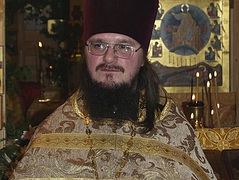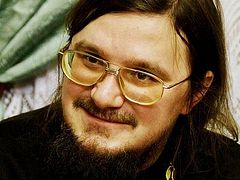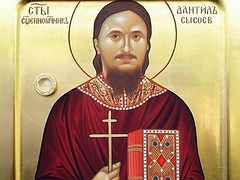One of the important steps on Ludmila Esipenko’s path into the Church was when she came across the book Marriage to a Muslim, in which the author, Hieromartyr Daniel Sysoev, struck her with his direct, no-nonsense approach to the controversial topic. Fr. Daniel has continued to be an inspiration for Ludmila in her Church life, and in the article below, she explains his importance for Orthodox Christians today, examines his labors for Christ, and pinpoints what she believes is the most important theme running through his works.
 Fr. Daniel Sysoev, whose home was always in Heaven. Photo: orthoview.ru
Fr. Daniel Sysoev, whose home was always in Heaven. Photo: orthoview.ru
Would you like to learn about a man who baptized more than 80 Muslims and died a violent death at 35 years of age?
I became a churchgoer in 2010.
About three to four years before that, I, then a completely secular person, was walking in the center of Moscow and stopped near the Church store of one parish. I stopped only because my gaze fell upon a green-covered book with the title, Marriage to a Muslim. It was written by Fr. Daniel Sysoev. I was struck at that time with what directness, sincerity, and uncompromisingness the author speaks in it on such a difficult subject.
For a long time after that I perceived the Russian Orthodox Church according to this book and its author: It seemed to me that all the priests in the Russian Orthodox Church are like this Daniel Sysoev, and that every single one of them speaks so honestly, directly, and openly as he does on complex topics.
 Fr. Daniel celebrating a Baptism. Photo: pravoslavie.ru
Fr. Daniel celebrating a Baptism. Photo: pravoslavie.ru
Only four years later, having begun my Church life, did I find that not everyone in the Orthodox Church is so uniform and monolithic as it seems to someone on the outside who is not immersed in Church reality. For me, for example, this book of Fr. Daniel Sysoev, in which he directly speaks about the Orthodox view on Islam, without equivocation, concealing nothing, was quite enough for me to be imbued with Orthodoxy,
I didn’t need any coffee hours, balls, film clubs, or other enticements used to attract the youth to the Church and are therefore called “missions.” We live in a world where entertainment is the norm. It didn’t used to be this way. As Fr. Seraphim (Rose) said, it is as if we live in a giant Disneyland. We don’t take ourselves very seriously; we don’t take others seriously. It’s like we are always playing—not really living, but playing: with our own lives, with our fate, with the fates of others. We don’t see ourselves as persons, and we don’t see others as persons. But Fr. Daniel perceived others as persons, created in the image of God.
He said: “We love people as the image of God, despite their evil, not together with it.” Fr. Daniel very often repeated that we must love man and not love the delusions with which he is infected. He said that we are not obliged to respect the delusions of others: We must love Muslims and not Islam. We must love Buddhists and not Buddhism. We must love Roman Catholics and not Catholicism. We must love murderers and not what they do.
Fr. Daniel rebuked those, even bishops who think that Muslims can be saved, as Christians, because Christ said: I am the Way, the Truth, and the Life: no man cometh to the Father, but by Me. This is what Fr. Daniel taught: to separate sin from the sinner. We must hate sin and love the sinner. Fr. Daniel had a very clear understanding of this.
The Sacrament of Confession is based on this understanding: not identifying the person with the sin with which he is infected. When we go to Confession, we say that we have done something wrong. We repent of it, and we confess it. Thus, we can assess our actions. We can call some of our actions bad and some of our actions good. In Confession, we don’t say: “I’m bad!” We go and say: “This action I committed is bad. I don’t want to identify with it anymore; I want to change; I want to improve; I want to become a different person.” That is, during Confession, we separate ourselves from our bad words, actions, and thoughts that occur within us or that we do.
 Fr. Daniel teaching at the missionary courses he founded. Photo: klin-demianovo.ru/
Fr. Daniel teaching at the missionary courses he founded. Photo: klin-demianovo.ru/
If this rule applies to us, why doesn’t it apply to other people? Why can’t we separate other people from their words and actions, calling some actions good and some actions bad? Why? Often, when you point out to someone in a debate that he did something incorrectly, that he acted incorrectly somewhere, people, nourished by the humanistic world and who believe there is no Truth, but only opinions, and that everyone is correct in their own way, perceive it as an attack on their own self. Such believe people there is no Truth, but only “truth,” and everyone has it: I have my own truth, and you have your own truth. Well, that’s great! As they say. Such people don’t understand what Truth is: objective, eternal, unchanging. They don’t understand what is good and what is evil. And Truth—is goodness.
“Truth” (“Истина,” “Istina” in Russian), as our philosophers have emphasized, is derived from the word “естина” (“estina”) that is, it is that which exists. And falsehood is that which does not exist. Therefore, Truth is connected with existence; it is connected with life. But falsehood is connected with non-existence; it is connected with death.
Modern people do not understand this. They do not understand what formal logic is and that we can use it to establish Truth. Modern people don’t have the ability to make judgments. Every time we try to call black black, or white white, they tell us: “Judge not, that ye be not judged.” But we must understand that there is condemnation—it is when we condemn the person himself. And there is judgment. It is when we say that this or that act, this or that word, is bad. It doesn’t matter who did it, even if it’s President Vladimir Putin or the last homeless person of the Russian Federation. It doesn’t matter at all.
In this case, we make a judgment, we don’t condemn, because there is judgment, and there is condemnation, and judgment is a logical operation. There are three categories of logic: concept, judgment, and inference. In order to know the Truth, you have to be able to think correctly. Without it, you won’t get anywhere. But modern people, denying the possibility of correctly judgment between good and evil, reduce themselves to the level of the irrational, dumb beasts. People are created in the image of God, and God is rational. It is because we are created in the image of God that we are also rational individuals. Therefore, we can think and make correct judgments about good and evil and about what is truth and what is falsehood. As the Prophet Isaiah said: “Woe unto them that call evil good, and good evil; that put darkness for light, and light for darkness; that put bitter for sweet, and sweet for bitter!” (Is. 5:20).
Fr. Daniel Sysoev had this thirst for Truth. He understood what is good and what is evil. He did not conceive of Orthodox theology as Orthodox philosophy, as an occasion for babbling. No. He took it seriously. He understood what the Church is and that salvation is possible only within it. He understood that to be saved, we have to be within the Church and we have to well know our faith to build a life in accordance with it. He knew the Sacred Scriptures, the canons of the Church, the lives of the saints, and the liturgical texts exceptionally well and constantly referred to them as the foundation of his position.
Fr. Daniel’s classmate at the Moscow Theological Seminary, Fr. Alexei Limarev, recalls, “We love theology, but few could boast that they knew the teachings of the Holy Fathers. Daniel knew them. That’s why many students loved him.” This is what distinguished Fr. Daniel: The soundness of his position. He never spoke just from himself.
He knew the Sacred Scriptures well. He would read the entire Bible during Great Lent. He fasted until 3:00 PM every Wednesday and Friday, as the Typikon prescribes. He always wore his cassock.
We are always embarrassed about our faith. We are embarrassed to cross ourselves before eating when we’re in some public place. But Fr. Daniel was not embarrassed. Being out in a public place with like-minded people, he would get up and starting singing prayers before eating. He would sing loudly. Many people would even applaud.
He constantly went on all sorts of TV and radio programs, where he spoke on very difficult topics and uncompromisingly defended the Truth. He stressed that Orthodox Christians must always take the opportunity, if it arises, to go on secular television and radio, and use this opportunity for preaching, for mission work. Once, Fr. Daniel said that one of the programs he participated in scored the highest ratings of the year.
 Fr. Daniel and his Matushka Julia. Photo: pravmir.ru
Fr. Daniel and his Matushka Julia. Photo: pravmir.ru
Fr. Daniel didn’t have to be liberal with anyone, to adapt himself to anyone, to try to please someone. He told it like it is, as the Holy Fathers teach, as it is written in the Sacred Scriptures, and this would arouse interest. Fr. Daniel said on television:
There has been a lot of talk about rights, but as far as I understand, the very first right a person has is the right to live. We know that God gives life. His view on homosexuality is known. There are three unforgivable sins, for which God completely destroys nations completely: legalized murder, legalized homosexuality, and legalized sorcery. Sodom and Gomorrah were erased from the face of the Earth, Phuket Island was inundated by a tsunami, New Orleans was inundated by a hurricane for preparations for a gay parade. Why do you hate Moscow so much? Why do you want to destroy our entire people?
Fr. Daniel’s mother has said that the future Fr. Daniel showed himself as an ascetic already in first grade. The teacher called Daniel to the board and in front of the entire class began to mock him, saying, “Did you know, children, that we have a believer here?” “I bet you know some prayers, Daniel? And you go to church?” And in front of the entire class, while everyone was laughing, Fr. Daniel said directly: “Yes, I am a believer. I believe in God. I say prayers and I go to church.”
Many people tell us that by the end of the USSR there was no more mocking of the faith, no persecutions against religion. But we see in Fr. Daniel’s life that it is not so, that it’s a lie. Around this time, Fr. Daniel experienced a clinical death: He saw his soul leaving his body, and he saw an angel commanding him to return to his body. Perhaps because of these circumstances, of which Fr. Daniel’s life was full, because of these trials, he didn’t feel at home on Earth.
Fr. Daniel once taught:
Therefore I hated life; because the work that is wrought under the sun is grievous unto me (Ecclesiastes 2:17). The things a man does under the sun are all repugnant. They are absolutely meaningless, and the people who bind their lives to this world are foolish. Man’s place is not here! It’s amazing. Why does it become repugnant for man? It speaks to the fact that he is not of this world. Do you see? It’s not bad for fish in the water, but it’s bad for man on Earth. Why? Because his homeland is not here.
 Ludmila holding her passport outside a court case for destroying a blasphemous art display. The cover of her passport reads "My home is in Heaven," reflecting Fr. Daniel's teaching on uranopolitism.
Ludmila holding her passport outside a court case for destroying a blasphemous art display. The cover of her passport reads "My home is in Heaven," reflecting Fr. Daniel's teaching on uranopolitism.
One of Fr. Daniel’s most important themes is uranopolitism. There’s a Greek term, “uranopolitism,” which consists of two words: “uranos”—Heaven, and “polis”—city-state. It’s a Patristic term. Fr. Daniel did not invent anything. He just came across this term in the Holy Fathers and began to use it. Fr. Daniel spoke against patriotism and nationalism, and even moreso against Orthodox patriotism and Orthodox nationalism. He said that during Baptism we are born a second time; we are born into eternal life; we are born for the spiritual life. Therefore, we have died to this world that lies in sin; that lies in evil. As the Scriptures say: Love not the world, neither the things that are in the world… For all that is in the world—the lust of the flesh, the lust of the eyes, and the pride of life—is not of the Father but is of the world.
Fr. Daniel constantly said that Orthodox Christians are uranopolitans. That is, we are citizens of the Heavenly Israel, the Heavenly Jerusalem. We are just pilgrims and strangers here on Earth. We shouldn’t get attached to anything.
Uranopolitism is a very important, key point in Fr. Daniel’s preaching. It’s even more important than exposing Islam and other delusions and heresies. Therefore, the first post Fr. Daniel made on his Live Journal page was about uranopolitism. And the last post Fr. Daniel made, just a few hours before his death, was about uranopolitism. Therefore, I would argue that uranopolitism is the golden thread running throughout Fr. Daniel Sysoev’s life.
I would like to finish my narrative with the words of Fr. Alexei Limarev, who said about Fr. Daniel, “In life, beloved brother, you were a restless zealot, and you could not die peacefully; therefore, may you receive from the Lord the glorious crown of a martyr!”
 Fr. Daniel Sysoev and Achpriest Nicholas Toroptsev at the Church of the Apostle Thomas that Fr. Daniel founded. Photo: rebenki.ru
Fr. Daniel Sysoev and Achpriest Nicholas Toroptsev at the Church of the Apostle Thomas that Fr. Daniel founded. Photo: rebenki.ru
***
Ludmila takes an active approach to her Orthodox faith, and, like Fr. Daniel, has particiated in many pro-life demonstrations outside abortion centers and fights for a complete ban on abortion in Russia. In August 2015, Ludmila broke a blasphemous art display at the Moscow Manege exhibition center, for which she was under criminal investigation for a year, and was ordered by the courts to pay $11,400 (720,000 rubles) for the restoration of the blasphemous “art.”




